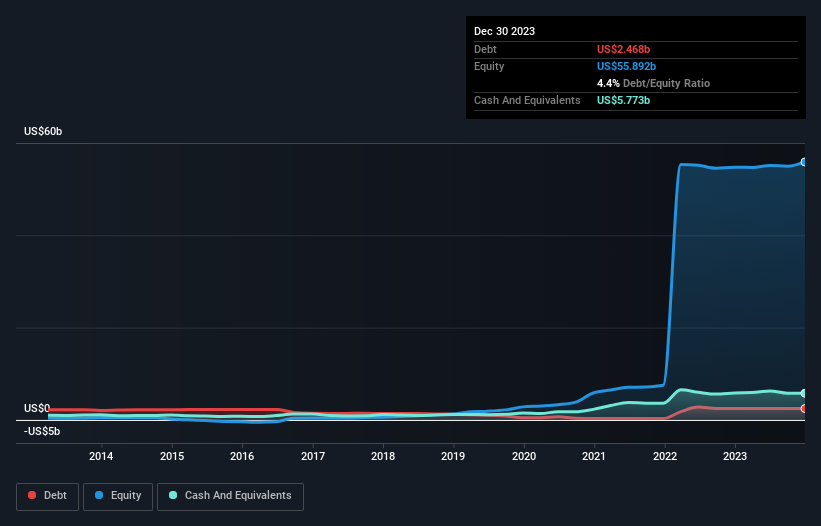Does Advanced Micro Devices (NASDAQ:AMD) Have A Healthy Balance Sheet?
David Iben put it well when he said, 'Volatility is not a risk we care about. What we care about is avoiding the permanent loss of capital.' It's only natural to consider a company's balance sheet when you examine how risky it is, since debt is often involved when a business collapses. We note that Advanced Micro Devices, Inc. (NASDAQ:AMD) does have debt on its balance sheet. But should shareholders be worried about its use of debt?
When Is Debt Dangerous?
Debt assists a business until the business has trouble paying it off, either with new capital or with free cash flow. In the worst case scenario, a company can go bankrupt if it cannot pay its creditors. However, a more common (but still painful) scenario is that it has to raise new equity capital at a low price, thus permanently diluting shareholders. Having said that, the most common situation is where a company manages its debt reasonably well - and to its own advantage. When we examine debt levels, we first consider both cash and debt levels, together.
See our latest analysis for Advanced Micro Devices
How Much Debt Does Advanced Micro Devices Carry?
As you can see below, Advanced Micro Devices had US$2.47b of debt, at December 2023, which is about the same as the year before. You can click the chart for greater detail. However, its balance sheet shows it holds US$5.77b in cash, so it actually has US$3.31b net cash.
How Strong Is Advanced Micro Devices' Balance Sheet?
The latest balance sheet data shows that Advanced Micro Devices had liabilities of US$6.69b due within a year, and liabilities of US$5.30b falling due after that. Offsetting this, it had US$5.77b in cash and US$5.39b in receivables that were due within 12 months. So it has liabilities totalling US$835.0m more than its cash and near-term receivables, combined.
Having regard to Advanced Micro Devices' size, it seems that its liquid assets are well balanced with its total liabilities. So while it's hard to imagine that the US$314.7b company is struggling for cash, we still think it's worth monitoring its balance sheet. While it does have liabilities worth noting, Advanced Micro Devices also has more cash than debt, so we're pretty confident it can manage its debt safely.
In fact Advanced Micro Devices's saving grace is its low debt levels, because its EBIT has tanked 69% in the last twelve months. Falling earnings (if the trend continues) could eventually make even modest debt quite risky. There's no doubt that we learn most about debt from the balance sheet. But ultimately the future profitability of the business will decide if Advanced Micro Devices can strengthen its balance sheet over time. So if you want to see what the professionals think, you might find this free report on analyst profit forecasts to be interesting.
Finally, a business needs free cash flow to pay off debt; accounting profits just don't cut it. While Advanced Micro Devices has net cash on its balance sheet, it's still worth taking a look at its ability to convert earnings before interest and tax (EBIT) to free cash flow, to help us understand how quickly it is building (or eroding) that cash balance. Happily for any shareholders, Advanced Micro Devices actually produced more free cash flow than EBIT over the last three years. That sort of strong cash generation warms our hearts like a puppy in a bumblebee suit.
Summing Up
While it is always sensible to look at a company's total liabilities, it is very reassuring that Advanced Micro Devices has US$3.31b in net cash. And it impressed us with free cash flow of US$1.1b, being 140% of its EBIT. So we don't have any problem with Advanced Micro Devices's use of debt. When analysing debt levels, the balance sheet is the obvious place to start. However, not all investment risk resides within the balance sheet - far from it. Be aware that Advanced Micro Devices is showing 2 warning signs in our investment analysis , you should know about...
Of course, if you're the type of investor who prefers buying stocks without the burden of debt, then don't hesitate to discover our exclusive list of net cash growth stocks, today.
Have feedback on this article? Concerned about the content? Get in touch with us directly. Alternatively, email editorial-team (at) simplywallst.com.
This article by Simply Wall St is general in nature. We provide commentary based on historical data and analyst forecasts only using an unbiased methodology and our articles are not intended to be financial advice. It does not constitute a recommendation to buy or sell any stock, and does not take account of your objectives, or your financial situation. We aim to bring you long-term focused analysis driven by fundamental data. Note that our analysis may not factor in the latest price-sensitive company announcements or qualitative material. Simply Wall St has no position in any stocks mentioned.

